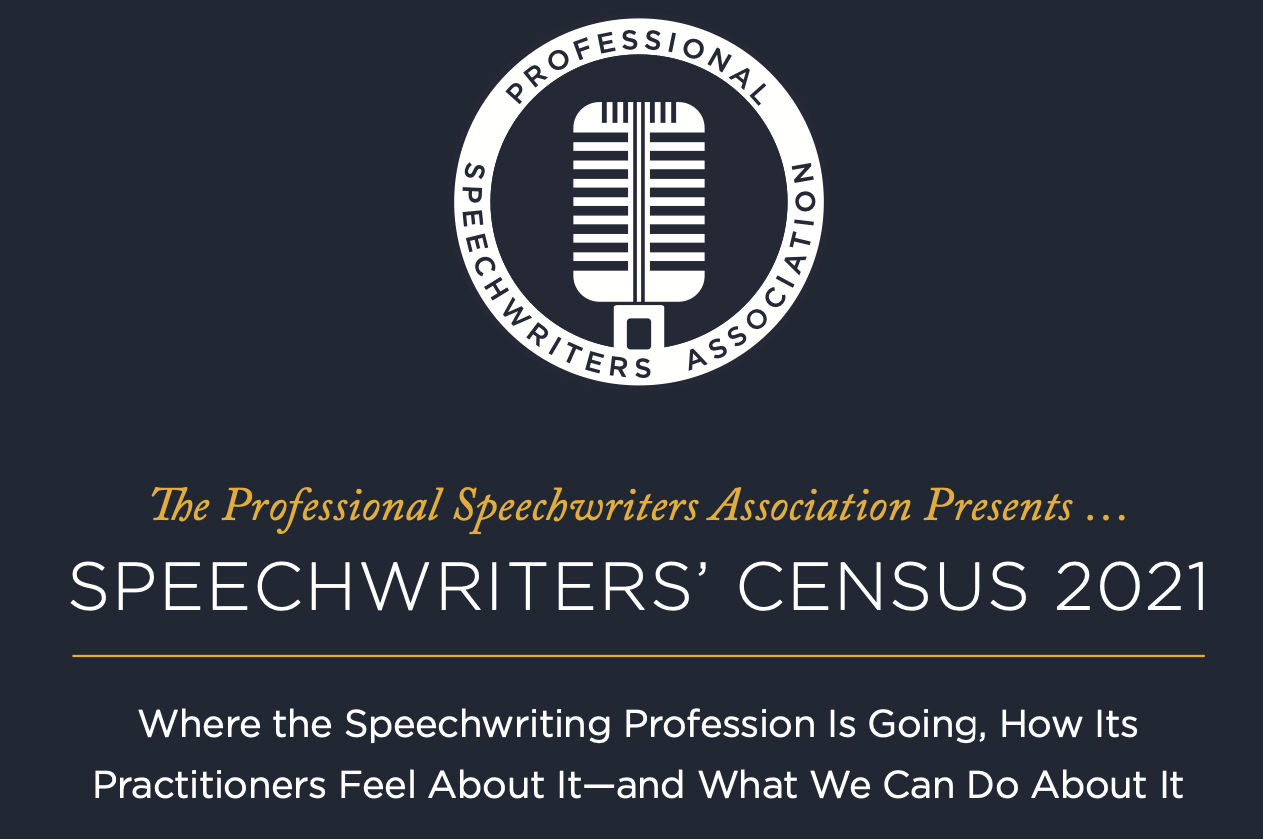Et tu, Harvard Business Review?
December 01, 2021
For speeches, "you never need a word-for-word script,” advises the Harvard Business Review—which is exactly what many leaders want to hear. Speechwriters, it's time we said something.
“The formal speech is dying,” was one typical anguished speechwriter’s response to the Speechwriters’ Census 2021, released last month by the Professional Speechwriters Association. “The verbatim speech is on its way out.” Said another: “There is simply no appreciation for direct, look-them-in-the-eye speeches and the resulting leverage you can develop from those events. And that’s very sad. … Executives are playing with fire because they’re ceding their ability to influence others.”
In that same report, I gave advice to those speechwriters and to many others with similar complaints, about speeches giving way to casual conversations and shambling presentations and a reliance on social media posts. I said speechwriters should “forcefully defend the traditional, formal speech, as at least an occasional necessity.”
But defend it against who, exactly? Directly against your principal, who you wish to please?
I think I just stumbled on another way to get at this issue: How about a group rebuke to a Harvard Business Review piece from earlier this year, titled: “Stop Scripting Your Speeches.”
The piece contains many of the false arguments, unconsidered attitudes and convenient canards of corporate leaders, about the creation and delivery of oral communication.
I’m going to take it on in my way—and then invite you to take it on, in yours.
Here are HBR’s main points:
A presentation audience doesn’t even have time to process—much less remember—specific words and phrases, so time spent conceiving and writing “the perfect words” is largely wasted on them, even if it brings comfort or pride to the speaker.
… writing a full speech is a process that excludes the audience, whereas delivering a speech with limited notes involves and incorporates the audience into the experience. This concept is critical, because humans are more apt to give attention to speakers who seem to, or actually do, demonstrate a sincere interest in them.
Imagine someone recommending a movie to you. Should that person look you in the eye and explain what makes the film compelling, or should they go home, write and edit a review, come back, and then read the finished review to you? Now imagine that person recommending not a movie, but a brilliant new marketing strategy, a breakthrough vaccine delivery system, or a campaign to save the earth. As an interested human being, you want to hear them make that case live and in their own spontaneously-generated words, not read something created apart from you and without you in mind. …
Reading also diminishes your ability to speak with personal conviction because, when you read a speech aloud, your mind is not focused on enlightening or inspiring your audience; it’s focused on the task of reading hundreds of carefully chosen words in succession. It isn’t easy to read words and project fervency simultaneously, but when you remove the script, you restore the human connection between the speaker and their audience and enable more emotional transmissions.
You speak without scripts in your workplace all the time: in meetings, job interviews, performance reviews, conference calls, and more. If that’s true, then you spend a lot of time trusting yourself, your experience, and your credibility when you speak spontaneously. Use that understanding to confidently realize you never need a word-for-word script to make compelling points.
The piece includes a disclaimer so disingenuous that it almost sneers at itself: “If you have a team of speechwriters working for you, you should certainly have them work their magic and then take your position behind glassy teleprompters to serve it up. But that’s not most of us.”
Look: We all know that the frequency of formal, scripted speeches is down. We might even agree that this is a good thing. At the PSA, we encourage (and help) speechwriters to find all kinds of creative ways help their principals communicate well in a variety of settings and formats: fireside chats, candid employee town halls, spontaneous video interviews. Speeches are but one part of a balanced executive communication breakfast.
But as for the argument that “you never need a word-for-word script to make compelling points”: Well, I’m going to take that down hard.
First off: The idea that an audience “doesn’t have time to process—much less remember” the words of a beautifully written speech: This may sound laughable to you and me, but it represents many executives’ innate contempt for language, and disbelief that words can make the kinds of differences that dollars can.
But even corporate leaders go to the movies. Does the audience have time to process all the words of an Aaron Sorkin screenplay? No. Does that mean we’d be better off if the actors would all be given bullet points, and told to riff?
Precise language is called for whenever a piece of communication needs to have a particular emotional or persuasive effect. That the audience doesn’t retain every last word of the speech is not an argument against careful speechwriting.
The analogy of someone reading you a movie review rather than telling you how they liked the movie: This was almost too self-evidently wrongheaded to include—except it represents the chronic confusion of corporate leaders about the special purpose of speeches: Speeches are not delivered, primarily, to persuade members of the audience, one by one, to the speaker’s point of view. Speeches are for communicating one-to-many, in a shared space, at a single moment in time, connecting the speaker to the audience and audience members to one another, in a communal experience, often as emotional as intellectual.
Yes, a stiff, wooden speaker reading stilted and stuffy words with little eye contact will fail at that objective. But that’s not what skilled speechwriters create–and it’s not what communication-committed leaders wind up delivering. In intellectual collaboration with a speechwriter and in careful speech rehearsal and audience analysis, a speaker can deliver a speech that deeply resonates with the people in the room. And even, if the message is powerful enough, on Zoom.
And the idea that “you speak without scripts in your workplace all the time”: Yes, but SXSW or Davos or the National Press Club ain’t the weekly staff meeting with Janet, Fred, Maggie and the gang. Even at the local Executive’s Club or an intra-industry conference, there are audiences inside and outside the room with many conflicting interests, listening from various points of view. Such addresses must be crafted with the utmost premeditative care—and delivered as prepared.
How about the earnings call where you need to explain to skeptical investors and vicious business journalists why the company’s taking a terrible financial hit this quarter and next, on an investment uncertain but likely to pay off in the future. Better get the language just right on that one.
And how about when that future comes, the investment didn’t work out, and layoffs are necessary. Shall we at least rough out a little script for that oral communique, if only to theatrically toss it at the last minute, and “speak from the heart”?
I’m getting snotty. I shouldn’t.
All of HBR‘s arguments for bullet points are age-old, going back to ancient preachers who argued with one another and themselves, about the best way to prepare a sermon. But in the corporate world, many of the biggest bullet-point boosters are speakers who don’t want to invest the necessary time to deliver a precisely worded speech with genuine feeling. So they toss the precision part, and lean heavily on the genuine feeling part.
And you know what audiences usually get in that case? They get a sense of a leader who’s trying to show she’s personable, which is nice. But what audiences of dozens or hundreds or thousands deserve in exchange for doing a speaker the preposterous favor of inconveniencing themselves to travel to one place to sit still and listen to one person talk, is a real idea gotten across in the very clearest and most compelling way that the speaker—and her speechwriter—can think to do it.
That’s what a speech is supposed to be. And often—not always, but often—the best way to do it is with a thoroughly collaborated-upon, deeply researched, well written, meticulously edited and well rehearsed script. And you know what those kinds of speeches wind up becoming? The closest thing to real intellectual policy that a leader or an organization ever produces. Such speeches may be converted to op-eds and white papers, can be excerpted for videos, can turn corporate managers into thought leaders. And they might be referred to in subsequent speeches, years or even decades hence. Such speeches become the “there,” there, in organizations and in leadership.
Note cards? They get tossed in the trash, on the way out of the ballroom.
Of course, a piece promoting bullet points goes down easier with typical Harvard Business Review readers than the truth: that truly compelling and effective leadership communication usually involves more thinking and more time than you are accustomed to putting in, and more professional writing help than you care to admit.
And that, I realize, has always been thus. I actually believe current low ebb of the scripted speech will be “transitory,” as the kids say today. As we return to in-person events, leaders are going to be less inclined to wing it, and more eager for the sense of control that a full script provides—and more committed to what will feel like more momentous speaking occasions.
Still, if there’s anything speechwriters might do to make the fear and loathing of corporate scripts as transitory as possible—now, and in the future—we should do it.
So if you generally agree with this article, I encourage you to share this article widely. Or write a rebuttal to the HBR foolishness in your own style, as independent speechwriter Cheril Clarke did on her podcast last month, asking and answering the question, “Is Speechwriting Dead?” Or write a rebuttal to me!
Whatever comes of this conversation, I plan to lash all the wisdom (including caveats) into a PSA white paper, “To Script, or Not to Script,” that speechwriters might send to the bullet-point-loving boss to make the case that sometimes a script isn’t just the best way to deliver a speech—it’s the only way to do it right.





Wow. The HBR article is a great example of exactly the pseudo-smart, half-baked “thinking” that a good speechwriter will expose in crafting a proper speech.
HBR uses the elements of a bad speech – an under-prepared haul through a leaden script with eyes down and voice monotone – as its way to attack the value of a good speech. That’s seriously muddled.
The killer line, for me, is this from HBR: “Writing a full speech is a process that excludes the audience…” No. Writing a BAD speech is a process that excludes the audience. A good speech is all about the audience: there is only ever an opportunity to communicate anything when what you want to say overlaps with what the audience is open to hearing about. Bullet points, despite the siren call of “authenticity”, are all about the speaker and their anxiety to get through something that IS tough – not about the audience at all. Besides, a good script, deeply felt and well prepared by the speaker, delivered with conviction has all the ingredients of authenticity you could ever need.
The answer to bad speeches is not worse speeches: it is not bullet points. The answer to bad speeches is better speeches, fully invested in by the organisation and the speaker, and delivered because they mean something both to the speaker and to the audience.